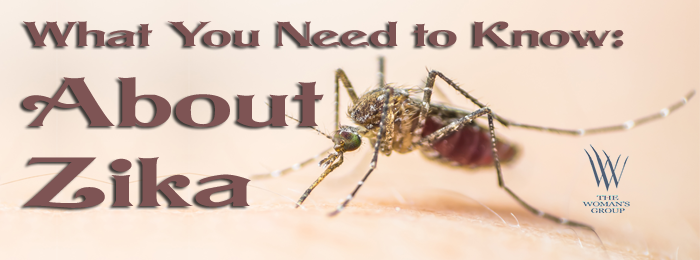An Open Letter About the Zika Virus, Mosquito Borne Virus, From All of us at The Woman’s Group Tampa to our OB patients and anyone who is pregnant, or considering becoming pregnant:
“As you may have read in the news, the Zika Virus has been quickly spreading across Central and South America with reports of more than 30 people in the U.S. already affected. Although the virus is inconsequential for most people, if pregnant women are infected, this may result in a miscarriage or serious birth defects to the baby. If you are pregnant or considering getting pregnant make sure that you use a reliable insect/mosquito repellent. If you are planning travel to Central or South America, please be aware of the risk involved and if you must travel to those areas, use a mosquito repellent at all times. For additional information, consult www.cdc.gov/zika”
History of the Zika Virus
Many of our patients have recently heard about a virus called Zika. The Zika virus is spread to people through mosquito bites. Common symptoms of the Zika virus include fever, rash, joint pain and conjunctivitis. The illness usually seems mild with symptoms lasting less than a week, but permanent complications to babies born of mothers who have been exposed to the virus, are being reported. Currently, there are no vaccines to protect us from this virus.
Last May(2015), the Pan American Health Organization (PAHO) issued an alert regarding the first confirmed Zika virus infection in Brazil. These reports suggested the Zika outbreak in Brazil was tied to reports of pregnant women giving birth to babies with birth defects. Recently, the virus has been spreading across Central and South America, and currently, there have been US cases reported under investigation.
Zika Prevention for Everyone
The Centers for Disease Control and Prevention(CDC) recommends that if you travel to countries that have reported cases, there are some preventive measures you should take:
• Cover exposed skin with long-sleeved shirts, trousers and hats
• Sleep under mosquito nets.
• Use Environmental Protection Agency(EPA)-registered insect repellents.
• Treat clothing and gear with permethrin or purchase permethrin-treated items. Do NOT use permethrin products directly on skin.
Zika and Pregnancy
Because there is special concern for Zika and pregnant women, the CDC and the PAHO recommend special precautions for pregnant women and women trying to become pregnant. Among these precautions is the recommendation that pregnant women in any trimester should consider postponing travel to the areas where Zika virus transmission is active. Pregnant women who travel to these areas should talk to their doctor first and strictly follow steps to avoid mosquito bites.
Here are some answers to frequently asked questions regarding Zika and pregnancy:
Q: If I am already pregnant, how will Zika virus affect me or my unborn baby?
A: There are recent reports of microcephaly, or smaller than normal head-size of newborn babies, and other poor pregnancy outcomes in babies of mothers who were infected with Zika virus while pregnant. However, more studies are needed for conclusive data. Until more is known, the CDC recommends special precautions for pregnant women and women trying to become pregnant.
Q: Is it safe to use insect repellent if I am pregnant or nursing?
A: Using an insect repellent is generally safe and effective. Pregnant women and women who are breastfeeding should choose an EPA-registered insect repellents and use it according to the product’s label.
Q: If a woman is infected with the Zika virus, can future pregnancies be at risk?
A: Zika virus usually remains in the blood of an infected person for only a few days to a week. There is currently no evidence that Zika virus infection poses a risk for future pregnancies. However, a woman contemplating pregnancy, who has recently recovered from a Zika virus infection, should consult her healthcare provider after recovering.
Q: Should a pregnant woman who traveled to an area with the Zika virus be tested for the virus?
A: If you are pregnant and develop a fever, rash, joint pain or red eyes within 2 weeks after traveling to a country where Zika virus cases have been reported, you should see your doctor immediately. Be sure to tell your health care provider where you traveled.
Q: If a woman has traveled to an area with active Zika, should she wait to get pregnant?
A: There is currently no evidence that Zika virus infection poses a risk of birth defects in future pregnancies. A women contemplating pregnancy, who has recently traveled to an area with local Zika transmission, should consult her healthcare provider after returning.
If you have any concerns about your personal health or the health of your baby and the Zika Virus, schedule an appointment to talk with your doctor at The Woman’s Group.


Comments (1)
Strong Link Between Autism and Pesticide Exposure